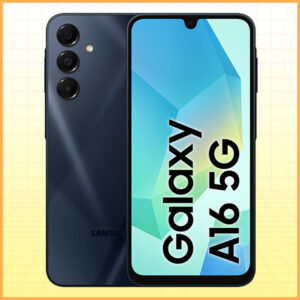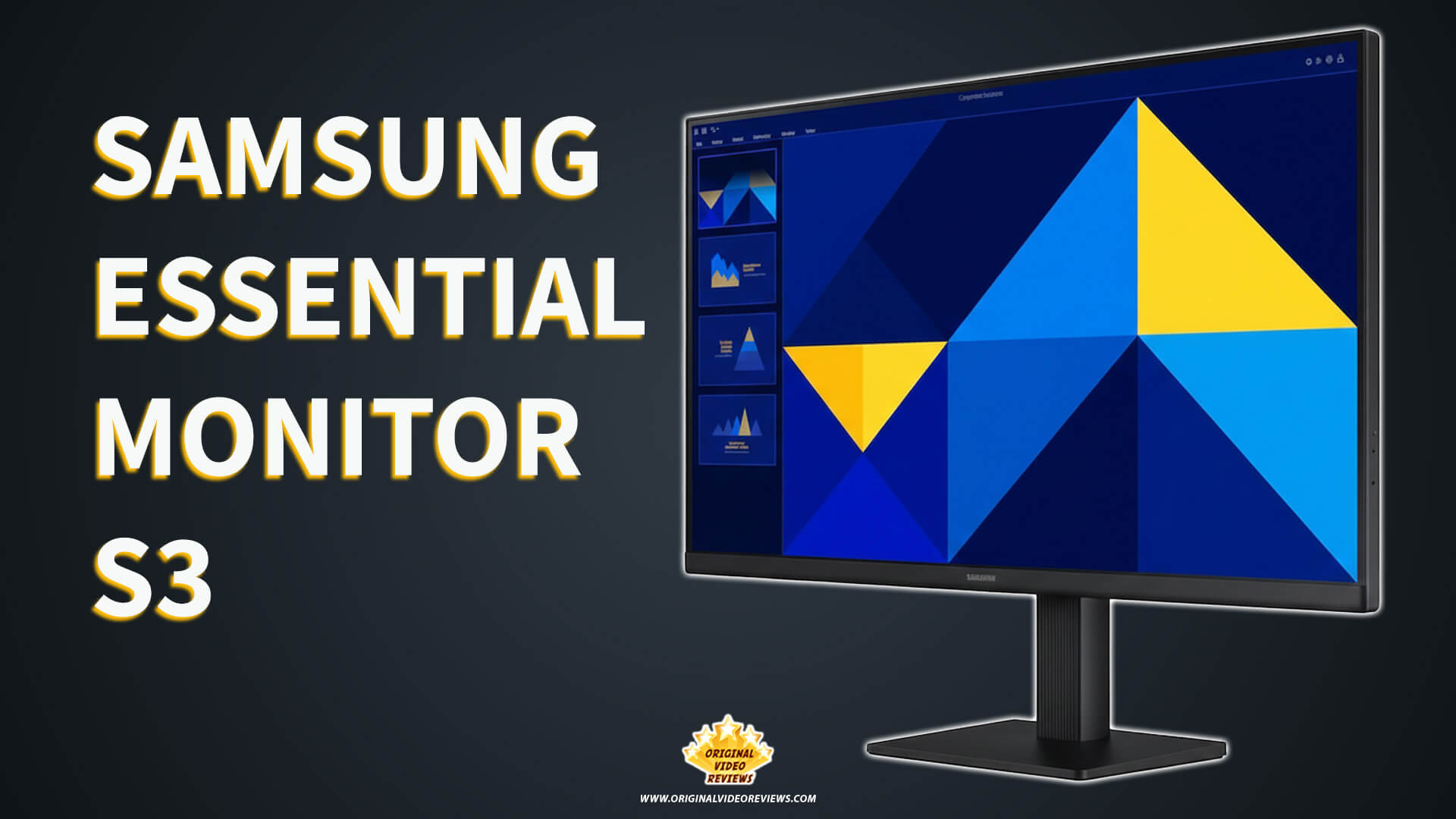Introduction
As part of my ongoing exploration of Samsung’s entry-level smartphones, I recently reviewed the Galaxy A06 and found it surprisingly worthwhile for certain audiences — despite missing one crucial feature: NFC.
Now it’s time to take a closer look at its successor, the Galaxy A16. With NFC onboard and a slightly higher price tag, the big question is: what else has changed, and who is this model really for?
The video below kicks off the full review and gives you a first look at what the Galaxy A16 has to offer. Don’t miss it!
Samsung Galaxy A16 Smartphone Review: Unboxing, Overview & Camera Demonstration 📱🔎📝
(OriginalVideoReviews YouTube channel)
Product details
| Brand | Samsung |
|---|---|
| Model | Galaxy A16 |
The Galaxy A16 comes with up to 6 generations of OS upgrades and 6 years of security updates, ensuring support through November 30, 2030 — a notable commitment for an entry-level smartphone.
The processor is officially a step up from what we saw in the Galaxy A06, but in real-world usage, performance felt surprisingly inconsistent — at times, it actually felt slower than the cheaper model.
The battery is a generous 5,000mAh, which should comfortably get most users through a full day or more on a single charge.
The Galaxy A16 supports up to 25W fast wired charging, though this is the maximum supported speed. Actual charging performance depends on the charger and cable used — and to reach full speed, you’ll need a compatible USB-C charger that supports Samsung’s PPS protocol. Also, the phone does not include a charger in the box.
It’s important to note that the Galaxy A16 does not support wireless charging, which is a common omission in this price range.
The display offers a decent FHD+ resolution with up to 60FPS playback. It’s not a standout, but it delivers a satisfactory experience for most use cases.
The rear camera setup includes a triple-lens system: a 50MP main sensor, a 5MP ultrawide lens, and a 2MP macro lens. This is an upgrade over the Galaxy A06‘s dual-camera configuration. While the main camera performs adequately in good lighting conditions, low-light performance is underwhelming, and the digital zoom lacks clarity.
Unlike the Galaxy A06, this model does not include a 3.5mm headphone jack. Instead, the USB Type-C port functions as the audio output, which may or may not suit your needs depending on how you listen to audio.
Note: This review covers the Samsung Galaxy A16 (non-5G) version.
A separate Galaxy A16 5G model is available in some regions, and it may differ in terms of hardware, performance, and feature set (click here to check it’s specs).
If you’re considering the 5G version, make sure to check the exact specs and region availability before purchasing.
Specifications
| Weight | 200 grams |
|---|---|
| Dimensions (H×W×D) | 164.4 × 77.9 × 7.9 mm |
| Processor | Octa-Core · 2.2GHz, 2.0GHz |
| Battery Capacity | 5,000mAh · Non-removable |
| Charging | Supports up to 25W fast wired charging; no wireless charging support |
| Display Size | 6.7″ (169.1mm) |
| Resolution | 1080 × 2340 (FHD+) |
| Technology | Super AMOLED |
| Color Depth | 16M |
| Rear Camera | |
| Resolution | 50.0MP + 5.0MP + 2.0MP |
| F Number | F1.8, F2.2, F2.4 |
| Auto Focus | Yes |
| OIS | No |
| Digital Zoom | Up to 10× |
| Flash | Yes |
| Front Camera | |
| Resolution | 13.0MP |
| F Number | F2.0 |
| Auto Focus | No |
| OIS | No |
| Video Recording | FHD (1920 × 1080) @30fps |
| Slow Motion | 120fps @HD (1280 × 720) |
| Performance & Storage | |
| Video Playing Resolution | FHD (1920 × 1080) @60fps |
| Memory (RAM) | 4GB |
| Internal Storage | 128GB |
| External Storage | microSD (up to 1.5TB) |
| SIM Card Slot | |
| Number of SIM | Dual-SIM |
| SIM Size | Nano-SIM (4FF) |
| SIM Slot Type | SIM 1 + Hybrid (SIM or microSD) |
| Networks | |
| Infra | 2G GSM, 3G WCDMA, 4G LTE FDD, 4G LTE TDD |
| 2G GSM | GSM850, GSM900, DCS1800, PCS1900 |
| 3G UMTS | B1(2100), B5(850), B8(900) |
| 4G FDD LTE | B1(2100), B3(1800), B5(850), B7(2600), B8(900), B20(800), B28(700) |
| 4G TDD LTE | B38(2600), B40(2300), B41(2500) |
| Connectivity | |
| USB Interface | USB Type-C, Version 2.0 |
| Earjack | Operates as an earjack |
| Location Technology | GPS, GLONASS, Beidou, Galileo, QZSS |
| MHL | No |
| Wi-Fi | 802.11 a/b/g/n/ac · 2.4GHz + 5GHz · VHT80 |
| Wi-Fi Direct | Yes |
| Bluetooth | v5.3 |
| NFC | Yes |
| Software & Features | |
| PC Sync. | Smart Switch (PC version) |
| Operating System | Android 14 |
| Sensors | Accelerometer, Fingerprint Sensor, Geomagnetic Sensor, Light Sensor, Virtual Proximity Sensing |
| Stereo Support | No |
| Durability | |
| Dust & Water Resistance | IP54 |
Inside the box
| Smartphone × 1 |
| USB cable × 1 |
| SIM eject tool × 1 |
| Documents × 1 |
Pros
NFC technology: In my opinion, this is the standout feature of the Galaxy A16, enabling convenient mobile payments – a functionality that has become indispensable in 2025 (where available, of course). This addition sets the device apart from Samsung’s entry-level lineup, particularly the Galaxy A06 (which I recently reviewed), which lacks NFC despite being launched several months earlier.
Affordable price for a Samsung smartphone: While the Galaxy A16 costs nearly twice as much as the Galaxy A06, it still represents a budget-friendly option compared to Samsung’s mid- and high-end devices. It carries the trusted Samsung brand name and offers most of the essential features needed for an average user’s daily needs.
Decent look & feel: Although the Galaxy A06 is slightly taller (2.9mm), thicker (0.1mm), and 11 grams heavier (a barely noticeable difference), these changes make the Galaxy A16 appear more elegant. This is further complemented by the dark color of the device I received and its rounded edges. Based on what I read, the frame and back are made of plastic, but they feature a shiny metallic finish that blends seamlessly, avoiding the appearance of two separate parts. Additionally, the back is completely smooth compared to the Galaxy A06.
Long-term software support: Samsung promises six generations of OS updates and six years of security maintenance for the Galaxy A16. With proper care, this ensures the phone will stay functional and secure until at least November 30, 2030.
Cons
Only 30fps for Video Recording in FHD: One surprising drawback of the Samsung Galaxy A16 is its video recording capability. The A16 offers video recording at Full HD (1920 x 1080) resolution, but only at 30 frames per second (fps). This limitation is particularly unexpected because the more affordable Samsung Galaxy A06, which I recently reviewed, offers the same video resolution at a higher frame rate of 60 fps. As a result, users may find the A16’s video recording less smooth and fluid compared to the A06, especially during fast-moving scenes.
No stereo support: This won’t significantly impact you if you primarily use earphones – just make sure they’re wireless, as the Galaxy A16 lacks a 3.5mm headphone jack. However, if you rely on the built-in speaker, the absence of stereo sound will be noticeable, especially if you’re accustomed to higher-quality audio from other devices. That said, this is a common limitation among entry-level smartphones, including other Samsung models.
No wireless charging: Wireless charging is another feature absent from the Galaxy A16, as is typical for entry-level devices. While users accustomed to higher-end models might miss this convenience, those content with traditional wired charging may find it less of a concern.
Performance feels less smooth than expected — even with a more powerful chipset: While the Galaxy A16 is equipped with a more capable processor compared to the Galaxy A06, it doesn’t deliver a noticeable improvement in day-to-day responsiveness. This is particularly evident when unlocking the device, where brief delays are common. Such sluggishness isn’t unusual for entry-level devices — I’ve experienced similar behavior with other models as well. Still, I had hoped the upgraded hardware would result in better performance, but in practice, it often feels less responsive than the A06. It’s possible that the overall experience is influenced by other hardware or software differences, and at this price point, compromises are to be expected.
Overall Verdict
Overall, the Galaxy A16 is a solid budget smartphone.
Its main strengths include the fact that it’s a Samsung device, offered at a reasonable price, with a clean and modern design (even if it doesn’t break any new ground), a decent camera, long-term software support with security updates promised through 2030, and most notably — built-in NFC support for contactless payments and compatible services.
On the downside, performance isn’t as smooth as expected, and the phone lacks premium features like a high-end camera or wireless charging.
I recommend the Galaxy A16 for younger users and older adults who are looking for a practical, modern device that supports mobile payments. If NFC is important to you — this model gives you that feature at a very accessible price.
If, on the other hand, you’re buying a phone for very young kids (where mobile payments aren’t needed), or for elderly users who aren’t expected to use NFC-based services — the Galaxy A06 is a more cost-effective option.
It’s also a good fit as a simple business-use device — for example, as a work phone that doesn’t need to support advanced features.
Where to buy
Below are links to purchase the Samsung Galaxy A16 (or similar models):
Photos
User manual
User Manual: No official manual is currently available for the Galaxy A16 (non-5G) model.
However, a guide for the Galaxy A16 5G version is available here, and it may offer partial assistance depending on your region and model.
Additional links
FAQ
Got questions about the Samsung Galaxy A16?
Feel free to drop them in the comments — I’ll do my best to help.
And if you’ve already tried the Samsung Galaxy A16 yourself, I’d love to hear your thoughts.
Your feedback might help others decide whether this smart TV is worth picking up.
Comments
Subscribe OVR channels
Choose the channels you like and subscribe on YouTube.
Follow us
Explore more content, updates and fun moments on social media.
Disclaimer
This post contains affiliate links. Please check out my disclosure policy for more details.
Thank you for your support & understanding!





